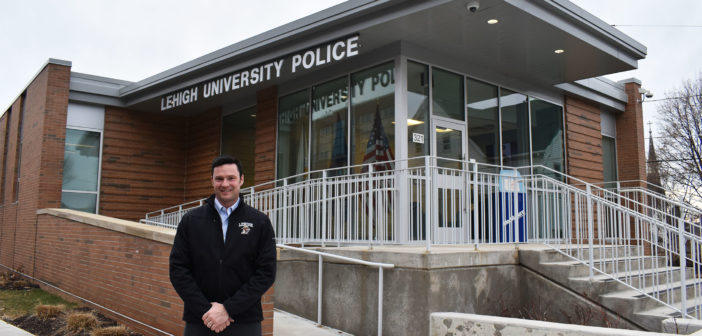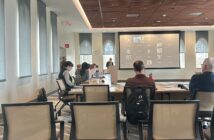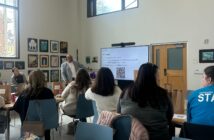New Lehigh University Police chief and former Bethlehem Police chief Jason Schiffer sat down with The Brown and White to discuss his plans for the future of LUPD and the campus community.
Q: You served as the Bethlehem police chief from 2011 to 2013. How do you think that will help you to serve the Lehigh community as the Lehigh police chief?
Schiffer: Well, certainly my experience leading a police department, but I think probably the most defining thing that will help me as the Lehigh police chief is my years as a beat cop here in South Bethlehem, and that defined me more, I think, than the role of police chief did. I was the neighborhood cop here on the South Side and my beat was the area that surrounds Lehigh University. So years of experience working in this exact neighborhood, working with the business owners, the community leaders, stakeholders on campus, working with students and all of the issues and concerns of safety on and off campus. I think that experience will help me more than anything else.
Q: One thing Lehigh students wonder about is the jurisdiction or differences between LUPD and Bethlehem PD. Can you shed any light on that? What might fall within Lehigh’s jurisdiction if it’s off campus or what might fall to Bethlehem police?
Schiffer: Well, currently the law is Lehigh police have jurisdiction to just the areas immediately adjacent to the campus and, as you can imagine, that’s the kind of thing that’s left open to a little bit of interpretation, especially when we have a campus like Lehigh where there is not a clearly defined border between the campus and the city. Lehigh owns properties that were, maybe traditionally, seen as off-campus and we have jurisdiction in those areas and need to respond to calls in those areas. In the areas that are traditionally student housing, along Fifth Street and Hillside, some of those areas can be considered immediately adjacent to campus. In other areas we work closely with the Bethlehem police department in providing assistance, back up if needed and there are times that we respond when Bethlehem is responding to those areas to just check if they needed any assistance or if there’s any help that we could provide.
Q: How do you envision the ideal relationship between Lehigh students and LUPD?
Schiffer: I would like it to be a relationship of open communication, trust and one where students can look to the Lehigh police department for guidance and assistance and (understand) that we’re there to aid in the entire education process. My goal would be that we’re not just viewed as the enemy or the enforcers of laws — that there can be something much greater than that. That might be a lofty goal, I understand that, but that’s what I would like to happen. The biggest population here on campus is young adults, and we would like to be part of the process to educate them and to provide them with the tools so that when they leave here they are great productive members of society. We can help steer students along that path, I believe. That’s what I’d love to see.
Q: Do you have any plans to improve that relationship?
Schiffer: I’m not foolish enough to believe I have all the answers. The tactics I would like to employ, No. 1, is listening. Listening to the students, listening to the community and hearing their concerns. We have certain parameters of what’s acceptable and what’s not acceptable and, as the police, we can’t go in and dictate what any community should desire for themselves. I need to meet with students and hear their concerns and try to come up with good solutions to the issues we’re all facing. Safety of the students has to be paramount. It’s not like we can go in and listen to what the students want and give in to it if that would result in very unsafe conditions and that type of a situation. There’s room for dialogue and that’s got to be the first step. Hopefully, we’ll be able to meet in the middle and work together on solutions. But what I would really like is an environment where the students aren’t posting lookouts for the cops so they can run from us, but they’re posting lookouts for each other so students aren’t getting into situations where they’re having to go to the hospital for high levels of intoxication and things like that. Looking out for each other, having each other’s backs, not just looking to get out of getting arrested. Building that community is going to take a lot of work and it’s going to take a lot of work on both sides.
Q: In recent months, people have been coming forward about sexual assault, even at here at Lehigh. In the past, students at Lehigh have felt discouraged from reporting sexual assault by the police and administration. What do you want to do to ensure victims feel empowered to come forward and that people are reporting these crimes?
Schiffer: That’s a very important issue. I want to create an environment where victims of any sexual assault or sexual crimes or harassment don’t feel re-victimized when they come through the reporting process and we have to do a very good job of ensuring that that doesn’t happen. I know the police certainly have not always been perfect in that end and I’m sure that Lehigh police have maybe not done the best practices there. I have been in communication with the Dean of Students Office on this very issue, making sure that we work together…
The healing process after an incident like that can take a very long time, if it ever fully happens, so being very sensitive is something we all must do and certainly, the police must do. I know that there have been concerns about officers responding in uniform possibly to take a report of that sort of thing and, again, it draws attention to individuals, unwanted attention. From my understanding, there may have been instances when people had to come to the police department even though they did not want to prosecute the offense. That’s something that we would have to look at and say, ‘Well no, we’re not going to make people come to the police department or get visited by a uniformed officer if that’s not what they want.’ Their individual healing process is what has to come first. It’s a real delicate balancing act because we want to make sure that if there is evidence of a crime, that that can be best preserved for the benefit of the victim. In that instant, the victim may not want to report it, but in time they may want to and then it’s very important that we did our job the right way up front so that if they do want to proceed with a criminal prosecution we would have properly gathered evidence and go forward with it. But we have to look at it from the victim’s standpoint and make sure that we don’t do things to make the situation worse for them just to gather the necessary evidence. Not an easy task by any means, just being very sensitive to the reality. I’ve heard in the past and you hear it in the media, ‘Why didn’t this person come forward earlier’ and I don’t think that’s a question that’s ever fair to ask. The person comes forward when they feel it’s right to come forward, if ever. That’s up to them and we can’t prejudge because somebody waited whatever period of time that might be.
One of my passions while I was going through law school and my first law job, I worked while I was still at the Bethlehem police department, I worked part-time at a law firm on the plaintiff’s side representing individuals who were victims of sexual harassment, racial harassment, discrimination in the workplace, all those sorts of things. We would deal with those victims on a regular basis. I worked there, it was about maybe 20-25 hours a week, for two years so it’s some experience, but I have a lot of background in working in those cases as well, so I bring that with me too, and I’m going to try to bring that throughout the department.
Q: What is the most pressing issue or biggest issue you’re facing right now?
Schiffer: It may not be the biggest issue, but we cannot ignore the high levels of intoxication and students going to the hospital with BACs that are potentially fatal. That’s a huge concern, not just on this campus, but on campuses all across the nation.
Q: Recently the administration has been vocal about students going to the hospital, but it hasn’t always been that way. Students were hospitalized in the past, the school just didn’t publicize it. So how do you explain to students whether the situation really is getting worse or if it’s just kind of staying the same, but it’s always been bad?
Schiffer: That’s interesting and that’s something that really bears attention. Is it worse than it has been or is there more attention being paid to it? I don’t know, but I can only maybe guess that the frequency made some people feel like maybe if we publicize these incidents and make it known, that there’s more awareness of the situation. Kind of going back to what I was thinking with having students feel that they are members of a strong community and look out for each other. Maybe that awareness is a necessary step in that process.
Q: Do you think that parties will or should remain off campus or would you like to see them move back on campus?
Schiffer: I certainly don’t think they should be pushed off campus. I believe for a variety of reasons that students are safer if their activities are around campus. We have a lot of police officers, a lot of individuals, whether it’s Gryphons or deans, that are here solely for the safety and concerns of the students. So activity that is going on here, on campus, will inherently be safer. There is a whole host of other concerns in some of the off-campus housing, with a whole lot of people in a residence that’s very old, maybe not in good repair, putting a 100 or more people in one room. It goes back many, many years. I was an officer of record at a party many years ago, I think it was 1995, at a party in the basement and the basement steps collapsed, trapping all the students in the basement of the house. I’ve heard other stories just recently of floors giving way in the houses…But also the activity that takes place off-campus is more likely to draw complaints from the citizens of Bethlehem, drawing the attention of the Bethlehem police and leading to more of the results we’ve seen over the past semester.
Q: Bethlehem residents and Lehigh students have a notoriously tenuous relationship. What do you think Lehigh students can do to improve that relationship?
Schiffer: I think one of the first things is begin to view yourselves as citizens of this city while you’re here. That’s probably one of the biggest things that I would hear from the permanent residents of Bethlehem, that the students come in, you’re here for a short period of time and from their perspective they would say our city is being treated like your dumpster and you’re not respecting us or our city or our laws, whether it be noise or trash or things like that. So from their point of view, the students just weren’t acting as good citizens on any level. So a recognition, especially when you’re living off campus, but even as an on-campus resident and coming down here into the South Side. This is a great place, why would you treat this any different than you would act when you’re back home? I think one of the hallmarks of us as we grow and mature is the way we behave when no one else is looking. I think there’s this idea, ‘Well I’m at college this doesn’t matter,’ and you know that’s not necessarily true. This does count. You couldn’t think of leaving Lehigh and going to your first job and behaving the way some students believe they can behave while living off-campus here, that would just be completely unacceptable. Or go home and behave in your own neighborhood like that. Think about the fact that this is a real home to real people, who work hard, who have pride in their homes and what they’re doing, so there has to be a mutual respect.
Q: What is one thing that students don’t know about LUPD, or police in general, that you wish they did?
Schiffer: I think, just police in general, and obviously LUPD would fall under that, we’re just human, with lives and families, kids, spouses, significant others, who are, for the most part, driven by a passion of service and we want to do good things for the communities that we serve. We make mistakes, we’re fallible, I don’t think most officers view themselves as above anybody else. There’s a very real feeling of an us vs. them mentality, in our nation over a lot of issues, some of which are very real. But just like each one of us doesn’t want to be painted by a broad brush because we fit into a category, the police are the same way. I am not what another police officer’s bad deeds are, just like you are not what someone else’s bad deeds are that might fit into your category. And as a Lehigh student, just because some other students may have behaved poorly, I’m sure there are a lot of Lehigh students that don’t want to be painted with a broad brush… And that goes for every category that there is, and so probably what I would want everybody to know is we are all individuals and we can’t be placed into just one large category.
Q: What do you think one of the greatest challenges will be for you as police chief?
Schiffer: Gaining the respect of the student body. I’d like to make an influence on all of the lives of all of the students that are here and a positive influence and I think that’s a monumental task because of a lot of the preconceived notions, not just because of police, but maybe specifically about Lehigh police.
Q: Lehigh’s Interfraternity Council just implemented a rule banning hard alcohol at fraternity parties, so they are only allowed to serve beer and wine. Do you think that’s a step in a positive direction?
Schiffer: I do, I think it’s a huge step in a positive direction and maybe not for the reasons that you would think. I don’t think any of us care what kind of alcohol is being consumed, but I think it’s a recognition of something that maybe is causing a lot of problems. To me, it signals a step in the right direction, that there’s a recognition that the students bear a responsibility for their behavior and any outcomes…This ban, I believe, signals that there is room for a dialogue. Now there is at least one group on campus that is stepping up and saying we bear a responsibility and, from my perspective, that allows me to begin to meet them halfway, so let’s now really discuss what can we really do. What are the students going to do, what are we going to do? Obviously this is only the IFC which only represents a smaller percentage of campus, it’s not going to change everything by any means, but I hope that it opens the door for some good dialogue and changes in behavior and our reaction to behavior, so we get to a situation where we’re not having dangerous situations for students.
Q: Does LUPD still have a drone?
Schiffer: Yes.
Q: And what’s that used for?
Schiffer: It hasn’t been used since I’ve been here, but I know one of the purposes can be for locating missing persons, I know it has a camera so it can cover areas that would be very difficult for law enforcement. It’s available for other law enforcement agencies to use and we’ve had this situation in the past when I worked at Bethlehem, where we had missing people that we believed to be in a wooded area and there were times we requested a state police helicopter. (The drone) would enable us to search vast areas of land that we wouldn’t be able to do without it. As someone who deeply respects the civil liberties of all of our citizens, I can assure you that it will not be used to violate the sanctity or rights of our citizens, and that includes all members of the Lehigh community. I have no intention of ever using a device like that to look for criminal activity.
This Q&A has been edited for clarity and brevity.






Comment policy
Comments posted to The Brown and White website are reviewed by a moderator before being approved. Incendiary speech or harassing language, including comments targeted at individuals, may be deemed unacceptable and not published. Spam and other soliciting will also be declined.
The Brown and White also reserves the right to not publish entirely anonymous comments.
1 Comment
Good questions & good answers.